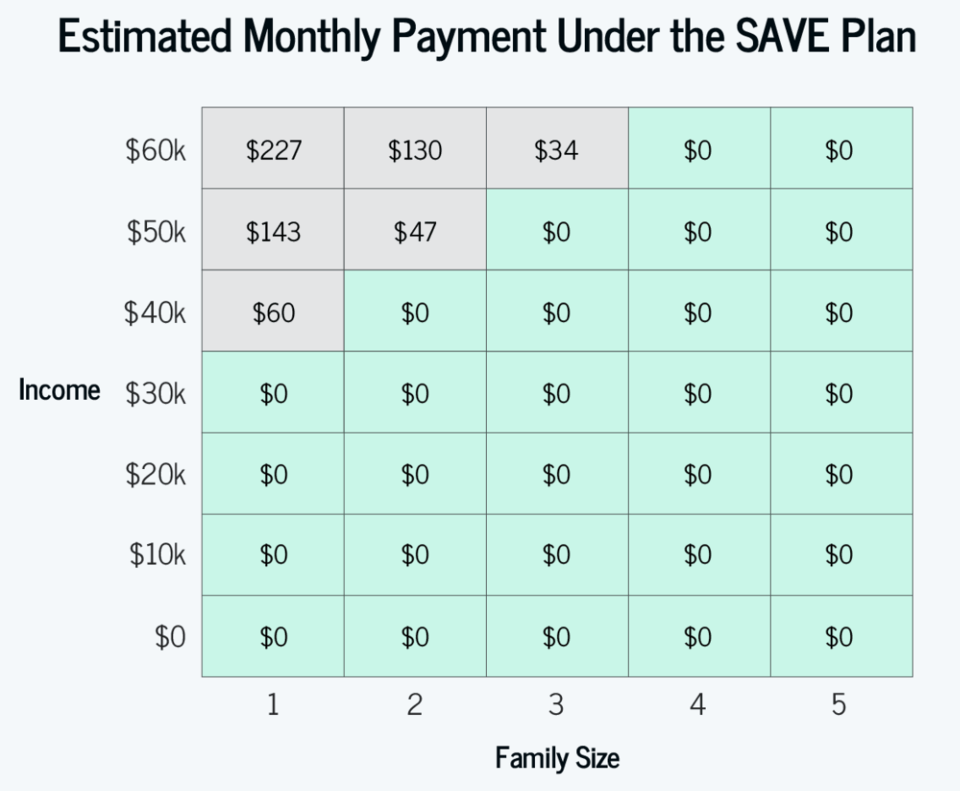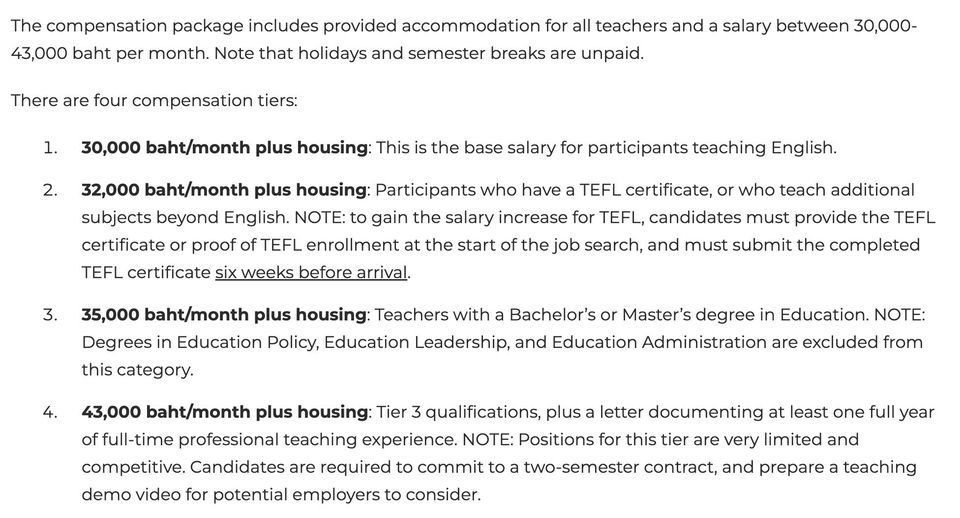Money Matters: Navigating Finances as an Expat Educator in Thailand
Let’s get straight to the point: money. Whether you have already accepted a position to teach in Thailand or are still considering applying, you have likely already learned that Thailand is an inexpensive country. Nonetheless, for many people, money might still be tight. Before I came to Thailand, I worked about 45 hours a week for almost four months to earn enough to start paying back student loans and save for traveling in Thailand.
Based on my experience meeting people at orientation, I know many people applying to teach in Thailand are fresh graduates who might be somewhat worried about financing their travel to Thailand. This post is intended to show people how affordable Thailand is, whether you decide to stay in your city or travel around the country.
Student Loans
The first thing I did financially in Thailand was enroll in the SAVE plan. In college, I had a government loan, making me eligible to enroll in this new program. This plan “calculates your monthly payment based on your income and family size. If you’re making $32,800 per year or less (roughly $15 per hour), your monthly payment will be $0,” according to FAFSA.
Initially, my student loan repayment program had me paying hundreds of dollars a month, and after enrolling in this plan, I can wait to repay my student loans until after I return to the US. What sweetens the deal even more, is that the government covers interest that accrues each month. My student loans have not gone up a cent since I arrived in October of 2023, even though I have not repaid them. If you similarly have government student loans, enrolling in the SAVE plan might be a good option.

Cost of Items in Pattaya
Pattaya, the city I live in, is one of the more expensive cities in Thailand, up there with other touristy destinations like Bangkok, Phuket, and Krabi. After living in the city for six months now, I have gotten my bearings and know when I am overpaying versus getting a fair price. Below, I include a chart of how much (on average) various items tend to be in my city.
Item | Price in Baht | Approximate price is USD (rate: 1 USD = 36.415) |
12 oz bottle of domestic beer (typical bar or restaurant) | 70 | 1.92 |
1 glass of house wine (typical bar or restaurant) | 180 | 4.94 |
cocktail (at a restaurant) | 200 | 5.49 |
cocktail (at a rooftop bar or specialty bar) | 500 | 13.73 |
16 oz water (7/11) | 10 | 0.27 |
Coca Cola (7/11) | 20 | 0.55 |
Coffee from 7/11 | 30 (hot) and 35 (iced) | 0.82 (hot) and 0.96 (iced) |
Coffee from cafe | 50-90 (extra 5 or 10 baht for ice) | 1.37-2.47 |
Medicine from the Pharmacy (cold, cough) | 80 | 2.20 |
Plate or Bowl from a Food Stand | 60 | 1.65 |
Sit down Thai restaurant | 80 | 2.20 |
Burger mid-range dining bar or restaurant | 200 | 5.49 |
Italian pasta dish (restaurant) - mid-range dining | 250 | 6.87 |
Movie Ticket | 120 | 3.30 |
Banana (7/11) | 9 | 0.25 |
laundry detergent (7/11) powder, 850 grams (lasts me a few months) | 95 | 2.61 |
80 grams toothpaste (7/11) | 55 | 1.51 |
4 rolls of toilet paper (7/11) | 60 | 1.65 |
Instant Ramen | 15 | 0.41 |
Dinner at 7/11 (2 portions since each one is kind of small) | 60 | 1.65 |
Grab motorbike or car for a 20-minute ride | 90 for a bike and 190 for a car (rates change between Grab and Bolt) | 2.47 (bike) 5.22 (car) |
Gym membership (the average of 3 gyms in or near the Pattaya area) | 1700/ month | 46.69 |
Electricity and Water for small apartment | 700/ month | 19.22 |
Phone plan (AIS) | 300/ month | 8.24 |
My Monthly Spending
Next up, I wanted to give you a general idea of how much I spend in a typical month in my city. Below is a small list of my lifestyle choices to give an idea of what I spend my money on:
- I cook dinner five times a week and go out for dinner twice. I am an oddball out for this as most people where I live will go to a local noodle stand, order food, or get dinner at 7/11. On average, cooking at home costs me around 90 baht, so I lose money by staying in rather than going out. I decided to cook at home because I enjoy cooking (it is one of my biggest hobbies) and because I cook Italian food about 90% of the time which gives me variety from Thai food.
- I eat school lunch every weekday and eat school breakfast three days a week.
- I go grocery shopping about once every week and buy about 5-10 items. I go there frequently because my church is right next to two grocery stores, so I stop by each week after service to pick up a few items.
- I go to the city on average twice a week. Once a week, I go to church (about a 10-minute motorbike ride), and sometimes I go to the mall (either a 15 or 20-minute ride).
- I go to my local fruit market every two weeks to pick up salad ingredients and fruit for the week. It is about a 15-minute walk from where I live.
- I buy myself a matcha latte once or twice a week from 7/11 or a coffee shop.
- I only drink alcohol about two or three times a month. I used to drink wine a lot more in the States with dinner and for a night with friends, but wine is expensive in Thailand (the cheapest bottle will be around $11, though they are typically closer to $16-18), so I cut a lot of alcohol from my lifestyle.
Category | Price in Baht | Approximate price is USD (rate: |
Grocery store (I buy mainly Western ingredients that tend to be expensive) | 4,410 | 121.10 |
Local Market | 690 | 18.95 |
Phone Bill | 300 | 8.24 |
Transportation (I only use Grab or Bolt motorbikes) | 815 | 22.38 |
Electricity and Water (based on usage) | 520 | 14.28 |
Rent | 0 (paid for by my school) | 0 |
Health Insurance | 0 (paid for by CIEE) | 0 |
Eating at home | -- (factored into grocery store bill) | -- |
Eating out | 1,195 | 32.82 |
Drinks (coffee shop or alcohol) | 385 | 10.57 |
Personal Spending (beauty products, new clothing, postcards, stamps, pictures) | 2,375 | 65.22 |
Total | 10,685 | 298.93 |
To get this information, I am using my Thai bank account where I organize all my day-to-day finances in Thailand. I only use my American credit card when booking travel, such as flights/ buses, tours, or accommodations. For this list, I am using the month of March to calculate my cost of living since I stayed in my city during that time.

Travel Spending
Some of the main things you will pay for when traveling in Thailand will be the activities you plan to do, accommodations, transportation, and a couple of extra meals a day. Traveling in Thailand can be cheap but could also get expensive depending on where you travel. Below, I wanted to share some of these general costs of traveling in Thailand, excluding activities or tours as these can range a lot based on the popularity of the activity and duration.
- Cost of Accommodations: In Bangkok, hostels can be around $15 a night, and a private room for two people might be more at $25 a night for a middle-range stay. Chiang Mai looks to be similar in pricing, though keep in mind these are typically somewhat expensive cities since they are touristy though high competition usually keeps the price in check. Places with low competition can be more expensive. For example, when I went to Khao Yai National Park (my first trip to Thailand), half of my budget was because of the accommodation I stayed in. Other places in smaller towns with higher competition might be much cheaper. For example, while traveling in the north, I found a private room for two people for less than $15 a night.
- Cost of Flights: Flights within Thailand are about 2,500 baht round trip ($68). To go to other Southeast Asian countries, round-trip tickets might be closer to 4,000-6,000 baht round trip. All the plane tickets I have bought thus far allow for a personal item and a cabin bag that weighs around 7 kg.
- Cost of Buses: To take a bus for 2-3 hours should be around 200 baht ($5.50), 5-6 hours around 350 baht ($9.60), and 12-hour buses about 1,000 baht ($28).
- Cost of Food: Thai food wins in terms of being both delicious and incredibly inexpensive. However, how inexpensive it is depends a lot on the region. In the Central region, where I live, the average cost of Pad Thai is around 60 or 70 baht. Meanwhile, when I traveled to Kanchanaburi, located in the West, Pad Thai was about 40 baht. The cost of food will depend on where exactly you are, but all around cheap (unless you are eating Western food).
Last Tip for Organizing Finances in Thailand
To be clear, I got my degree in the social sciences, not in finance or business, but I view myself as financially literate and responsible. I am by no means a financial wizard, but I think I do well at organizing my finances. Adjusting my finances to Thailand was a bit difficult for me and that was because of 2 main things:
- Lack of credit card usage in Thailand may make organizing your finances difficult. The US and many other Western countries are credit card cultures. I use my card to pay for one apple at a grocery store, and I rarely use cash. Girl math in the States is that if you spend money in cash, you aren’t spending money (since the number in your bank account won’t change). When you come to Thailand, most of your purchases will be in cash (or via QR code once you have your Thai bank account). That will be a difficult adjustment once you get here, but anticipate it happening, and remember spending in cash will soon be the primary way of spending.
- Converting baht to USD when purchasing items with baht. When I got here, I kept making the mistake of converting what I was spending to the cost in USD. Though this helps you learn the conversion rate, do your best to learn the price of things in baht as soon as possible. By using USD, I kept overspending on things like taxi rides and restaurants because it sounded so cheap in US dollars! However, when living on a Thai salary, it is best to get accustomed as soon as possible to the local currency. Make lists on your phone for how much the average price of Pad Thai is or how much a taxi is. This will help you learn soon what are fair prices and when you are being overcharged.
Happy finances everyone!
Related Posts

A Day in My Life Teaching Kindergarten
Before moving overseas, one question that constantly circled my mind was: What will my everyday life look like? I had lots of ideas, but I quickly realized it's impossible to... keep reading

One Month in Thailand: The Stages of Adjustment
Coming up on my one month of living and working in Thailand, here are some of my tips and tricks for adjusting to your new life here (based on my experience)

A School Day in My Life Teaching Pre-K
A month or so before moving to Thailand, I got the email that I was assigned to teach pre-kindergarten. I was ecstatic – I’d been hoping I’d get placed working... keep reading
